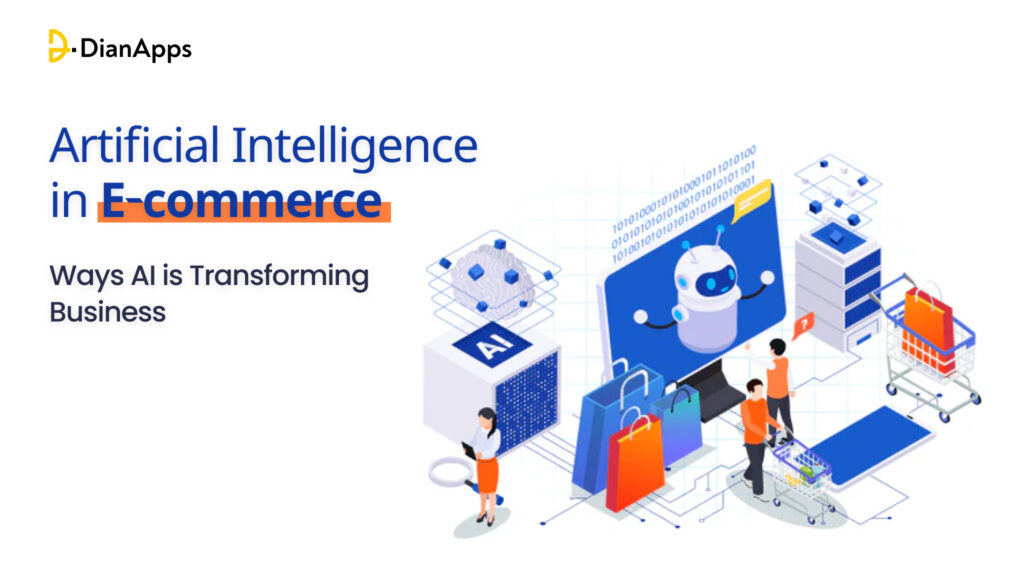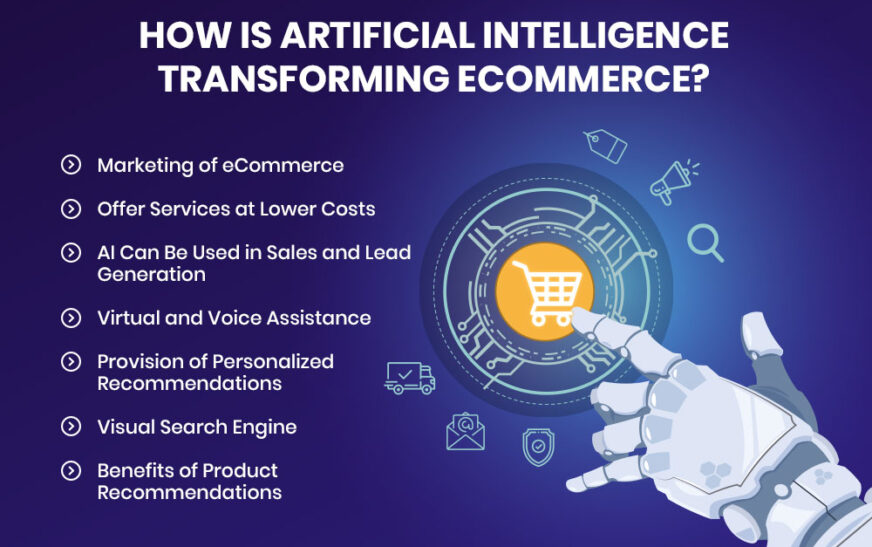Exploring the realm of AI investment opportunities in the eCommerce industry, this introduction sets the stage for a comprehensive discussion. From the transformative power of AI to its impact on customer experiences, this topic offers a wealth of insights for investors and businesses alike.
As we delve deeper into the landscape of AI investments in eCommerce, we uncover the latest trends, key areas of focus, and the challenges that come with implementing AI technologies in online retail.
Overview of AI in eCommerce
AI technology is revolutionizing the eCommerce industry by providing businesses with powerful tools to enhance customer experiences, streamline operations, and drive revenue growth. By leveraging AI solutions, eCommerce companies can gain valuable insights, automate processes, and personalize interactions with customers on a large scale.
AI Applications in eCommerce
- Product Recommendations: AI algorithms analyze customer behavior and preferences to offer personalized product recommendations, increasing sales and customer satisfaction.
- Chatbots: AI-powered chatbots provide real-time customer support, answer queries, and assist with purchases, improving the overall shopping experience.
- Inventory Management: AI algorithms optimize inventory levels, predict demand, and prevent stockouts, leading to efficient supply chain operations.
- Dynamic Pricing: AI tools adjust pricing in real-time based on market trends, competitor prices, and customer behavior, maximizing profitability.
Benefits of Implementing AI in eCommerce Businesses
- Enhanced Customer Experience: AI enables personalized interactions, faster responses to inquiries, and seamless shopping experiences, leading to higher customer satisfaction and loyalty.
- Operational Efficiency: Automation of repetitive tasks, such as order processing and inventory management, reduces human errors, saves time, and improves overall efficiency.
- Data-driven Insights: AI analytics provide valuable insights into customer behavior, market trends, and performance metrics, empowering businesses to make informed decisions and drive growth.
- Competitive Advantage: By adopting AI technology, eCommerce companies can stay ahead of the competition, innovate faster, and adapt to changing market dynamics effectively.
Current Trends in AI Investment in eCommerce
![AI in eCommerce Guide: Benefits, Examples, Challenges [2024] AI in eCommerce Guide: Benefits, Examples, Challenges [2024]](https://share.genpi.co/wp-content/uploads/2025/05/65fa70052297b389161ad546_How-is-Artificial-Intelligence-Transforming-eCommerce.jpeg)
AI investment in the eCommerce sector is rapidly growing, as businesses strive to stay competitive in the digital landscape. Companies are leveraging AI technologies to enhance customer experiences, streamline operations, and drive sales. Let's explore some of the latest trends in AI investment in eCommerce.
Personalized Shopping Experiences
AI algorithms are being used to analyze customer data and behavior to create highly personalized shopping experiences. By understanding individual preferences and buying patterns, eCommerce platforms can recommend products, tailor promotions, and optimize pricing for each customer.
Chatbots and Virtual Assistants
Chatbots powered by AI are becoming increasingly popular in eCommerce for providing instant customer support and assistance. These virtual assistants can answer questions, provide product recommendations, and even facilitate transactions, enhancing the overall shopping experience.
Visual Search Technology
AI-driven visual search technology allows customers to search for products using images rather than text. This feature enables users to find similar products, discover new items, and make purchases directly from images, revolutionizing the way people shop online.
Fraud Detection and Prevention
AI algorithms are being employed to detect and prevent fraudulent activities in eCommerce, safeguarding transactions and protecting customer data. By analyzing patterns and anomalies, AI can identify potential risks and mitigate them in real-time, ensuring secure online shopping experiences.
Inventory Management and Demand Forecasting
AI-powered tools are being utilized to optimize inventory management and predict demand trends in eCommerce businesses. By analyzing historical data, market trends, and customer behavior, AI can help businesses maintain optimal stock levels, reduce wastage, and improve supply chain efficiency.
Recommendation Engines
AI-driven recommendation engines are being used by eCommerce platforms to suggest relevant products to customers based on their browsing history, purchase behavior, and preferences. These personalized recommendations increase cross-selling opportunities and drive customer engagement and loyalty
Key Areas for AI Investment in eCommerce

Investing in AI within the eCommerce industry opens up a world of opportunities for businesses to enhance their operations, improve customer experiences, and drive growth. Let's explore some key areas where AI investment holds the most promise.
Optimizing Supply Chain Management
AI technology has the potential to revolutionize supply chain management in eCommerce by optimizing processes, reducing costs, and enhancing efficiency. By leveraging AI algorithms and machine learning, businesses can forecast demand more accurately, streamline inventory management, and automate logistics operations.
Personalizing Customer Recommendations and Marketing Strategies
One of the significant advantages of AI in eCommerce is its ability to personalize customer experiences through tailored product recommendations and targeted marketing strategies. AI-powered algorithms analyze customer data, behavior patterns, and preferences to deliver personalized recommendations, promotions, and content, leading to higher engagement and conversion rates.
Challenges and Risks in AI Investment in eCommerce

Investing in AI technology in the eCommerce industry can bring about numerous benefits, but it also comes with its fair share of challenges and risks that businesses need to navigate carefully.
Potential Challenges in AI Investment
- High Initial Investment Costs: Implementing AI technology can be expensive, especially for small to medium-sized eCommerce businesses with limited resources.
- Data Privacy Concerns: Collecting and analyzing customer data for AI algorithms can raise privacy issues and compliance challenges with regulations like GDPR.
- Integration Complexity: Integrating AI systems with existing eCommerce platforms and processes can be complex and time-consuming, leading to potential disruptions.
Risks Associated with AI Implementation
- Algorithm Bias: AI algorithms may unintentionally perpetuate biases present in the data used to train them, leading to unfair treatment of certain customer segments.
- Technical Glitches: AI systems are not immune to technical failures or errors, which can result in unexpected outcomes and disruptions in eCommerce operations.
- Dependency on AI: Over-reliance on AI technology without human oversight can lead to critical decision-making errors and loss of customer trust.
Strategies to Mitigate Risks and Overcome Challenges
- Invest in Data Security: Prioritize data security measures to protect customer information and ensure compliance with data protection regulations.
- Employee Training: Provide comprehensive training to employees to effectively use and monitor AI systems to prevent errors and biases.
- Start Small and Scale: Begin with pilot AI projects to test feasibility and gradually scale implementation to minimize disruptions and manage costs.
Concluding Remarks
In conclusion, the world of AI investment opportunities in eCommerce presents a dynamic and evolving landscape. From optimizing supply chains to personalizing customer interactions, the potential for growth and innovation is vast. As businesses navigate the challenges and risks, embracing AI can lead to transformative outcomes in the eCommerce sector.
FAQ Compilation
What are some key benefits of implementing AI in eCommerce businesses?
AI can enhance customer experiences, streamline operations, improve personalized recommendations, and drive sales growth.
What are the top areas within eCommerce where AI investment is most promising?
AI investment is highly promising in supply chain optimization, personalized marketing strategies, customer service automation, and fraud detection.
What are some common challenges businesses may face when investing in AI for eCommerce?
Challenges include high implementation costs, data privacy concerns, integration complexities, and the need for skilled AI talent.





